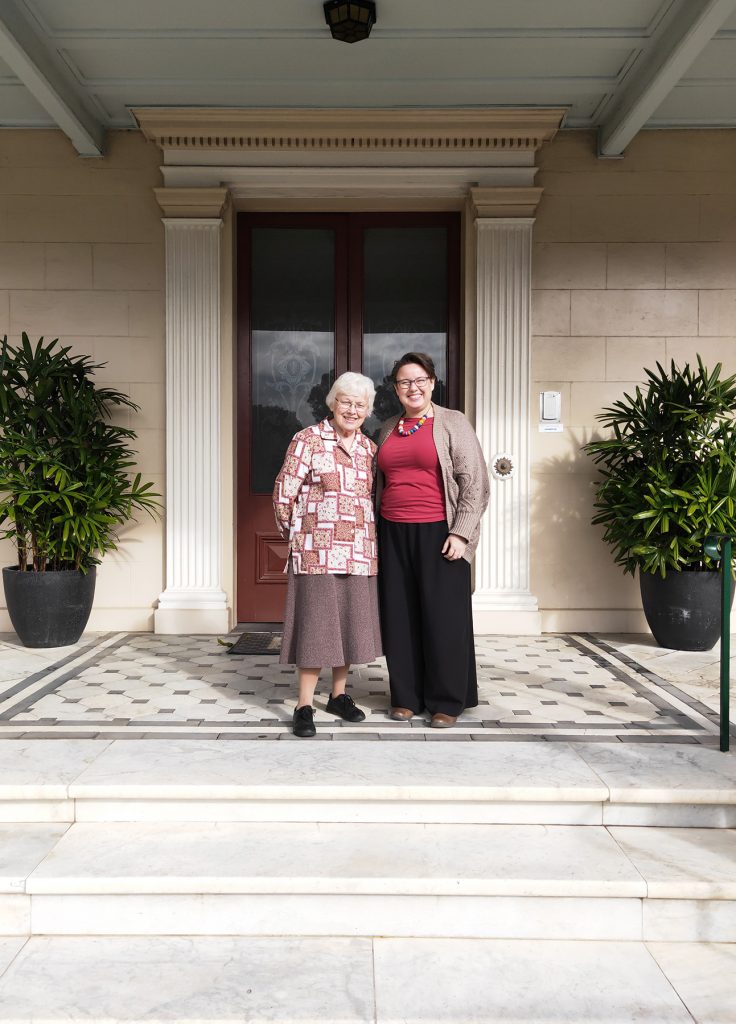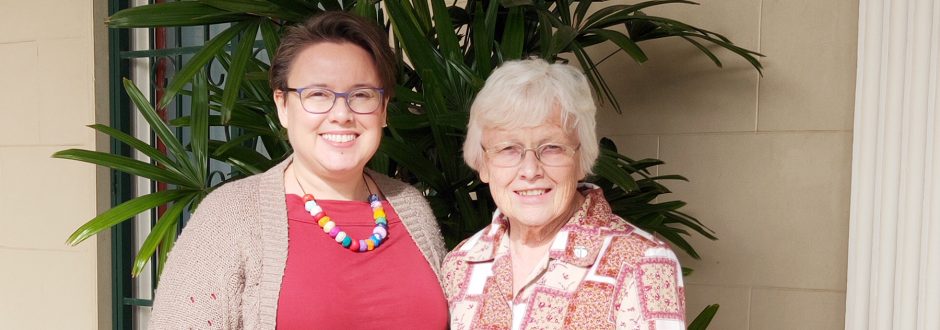The Good Sams archives are filled with a treasure trove of stories, as interesting as the stories of the archivists who keep them.
BY Debra Vermeer
In the archives of the Sisters of the Good Samaritan sits a treasure trove of historical records, telling the story of the Sisters since the Congregation’s foundation in 1857 and their contribution to education and social work in Australia, as well as their overseas mission works in post-war Japan and later in the Philippines, Kiribati and East Timor.

Sr Lia van Haren SGS handed over the reigns of the Good Sams’ archives to Joanna Mead earlier this year.
Sr Lia van Haren SGS has been the Congregational Archivist for almost 20 years and is handing over the management of the precious records to Joanna Mead, who started in January this year as the new Archives and Records Manager.
“The Sisters had always kept their records very carefully,” Sr Lia says. “In the early days they would’ve been kept in boxes around the place, but from the 1940s onwards, the Congregational Secretaries took a more active role in caring for all records.”
The congregational archives were officially started in 1985 when two Sisters were asked to take on the task.
Sr Lia, who came to the role in 2000 after many years of teaching, was born in Holland and came to Australia with her family in 1950, the second youngest of nine children.
Educated by Dominican Sisters and then Sacred Heart Sisters in Holland, she first met the Sisters of the Good Samaritan when she moved to Australia and attended Stella Maris College at Manly.
She says she felt a call to religious life from a very young age.
“I always had it,” she says. “From as far back as I can remember. When we came to Australia, I didn’t know any other nuns except the Good Samaritans. I didn’t really know a lot about them. I didn’t even know that they followed the Rule of Benedict, which I now love, but I was still drawn to religious life.”
After leaving school, Sr Lia worked for a while in an accounting firm, which she really enjoyed, but the pull to religious life prevailed, and she entered the Sisters of the Good Samaritan in 1958.
Following her formation, profession and teacher training, Sr Lia started out as a primary school teacher and was then asked to go to university where she majored in Japanese.
“I had spent some time in the Novitiate learning Japanese with a Sister who had come from Japan to enter the Good Samaritan Congregation,” Sr Lia says.
“So I was happy to be asked to study Japanese because I thought it meant that I might be sent to Japan, but that wasn’t how it worked out. Instead, when I finished the studies I was appointed to a school here and for the next few decades I was mainly a Maths teacher, a job I fortunately enjoyed very much.”
Sr Lia taught at St Mary’s Wollongong, St Patrick’s Campbelltown, Lourdes Hill Brisbane, and was Principal at Mount St Benedict Pennant Hills and Stella Maris Manly.
“Then I was able to take a year off because my mother was sick and after her death I was asked to go to Japan!” she says.
“I was surprised because I’d studied it so long ago.”
Sr Lia spent 14 happy months at Seiwa High School, Sasebo teaching English.
“It was a wonderful year. I just loved the people, loved the culture, loved all the experiences that I had there.”
Upon her return to Australia, Sr Lia was assigned to teaching again until the position of Archivist came up in 2000 and she put up her hand for it.
“I’d always had an interest in history and I thought it would be interesting work,” she says.
She undertook a distance Diploma course in Archives Management through Edith Cowan University in Western Australia and learnt on the job from the two Sisters who had begun the archives in 1985.
“The main idea of an archives is that records that come in are processed and archived in such a way that they are easy to find and use,” she says.
“At that time, in 2000, the use of computers was still fairly recent and one of the first jobs to do was to update the database we were using.
“A lot of the data we had was just on cards. It all needed to be updated to make it more useable.”
The increase in the number of people tracing their family trees has led to a rise in requests for information from the Archives, as well as people doing university studies, particularly in the areas of education and social welfare.
“I find that an interesting part of the job. When you are able to find something for people, they get so excited and it gives one pleasure to be able to find it for them,” Sr Lia says.
“We have so many requests for information. It makes you realise the work is important.”
Currently Sr Lia is helping a group of students from St Scholastica’s College, who are doing a project with the National Maritime Museum on the Good Sams’ involvement in Nagasaki just after the War.
She is also called upon to curate exhibits for special events within the Congregation.
“At our Chapter a couple of years ago, the Order was celebrating 160 years and I was asked for an exhibition on the history of the Order which was displayed at that Chapter. So a committee was formed to help me and we put that together. We recently also provided an exhibit when our Convent and Centre at Pennant Hills closed and that was really well received by people.”
Since Joanna’s arrival in January, Sr Lia is now working two days a week in the archives, to help provide a smooth transition. On the other days, she helps a couple of young refugee boys with Maths, volunteers with the Dutch Australian Cultural Centre’s Archives and visits the sick, especially among the Sisters.
Joanna, who was a student at Lourdes Hill College in Brisbane, a Good Samaritan school, has had a career in archives which includes 12 years with the National Archives of Australia and, most recently, two years as Archivist for the NSW Department of Industry.
She says one of the big tasks ahead of her is to work on digitising the Good Sams’ Archives.
“We’re a paper based archive,” she says. “Our current records and history, back to 1857, are all paper based. So one of the big challenges going forward will be digitisation and electronic storage.”
Specific challenges will include transferring material which is contained on audio and video tape to digital formats.
“By 2025 the playback equipment for those items will be obsolete,” she says.
“There has been some digitisation and copying of records but a large-scale approach to digitise the collection as a whole is now on the cards.”
Joanna says that having been a student of a Good Samaritan school, coming to work for the Sisters “felt a bit like coming home, coming full circle”.
“I’ve had all these life experiences and now I’m able to come back and bring them with me,” she says.
“I had a strong desire to work within a smaller institution that is more self-contained, a strong desire to get my hands back on the records themselves.”
“I’m attracted by the ethics of working with a group of women whose Congregation was established to help women. That was a really strong drawcard. I love the fact that the Good Sams were established to provide refuge and education and to make the lives of women and children better.”
“My job in the archives is to help share that story. To preserve it, to tell it, to make it accessible and to share it with the wider community. I feel very honoured.”
